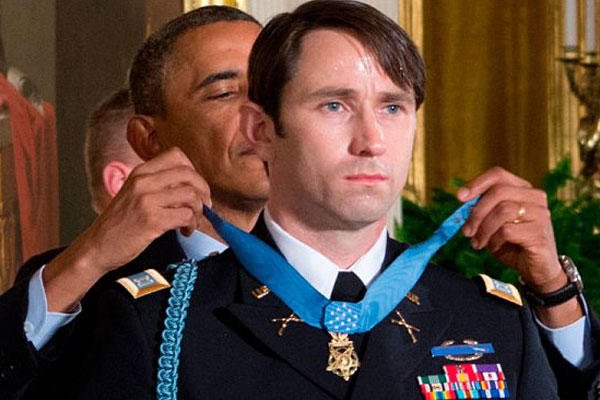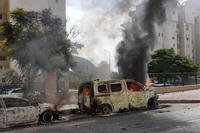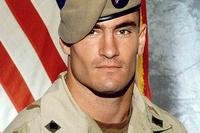The Pentagon's inspector general blames unnamed personnel at the U.S. military headquarters in Afghanistan -- but not the top brass -- for losing Capt. William Swenson's original Medal of Honor recommendation.
Swenson received the military's top award in October for his actions during a deadly firefight on Sept. 8, 2009, in the Ganjgal valley in Kunar Province. He's credited with risking his life to help evacuate a fellow soldier and retrieve the bodies of fallen troops.
The case drew scrutiny of the military's medals process after his initial nomination went missing. His supporters say it was done in retribution after he criticized superior officers for mismanaging the mission. He's also publicly indicated the Marine Corps' official narrative involving former Marine Cpl. Dakota Meyer, who received the award in 2011 for the same battle, isn't accurate.
Complications regarding Swenson's Medal of Honor process have been known, but Tuesday marked the day the Defense Department finally released the IG's report on the process.
Retired Army Gen. David Petraeus, then the top U.S. commander in Afghanistan, around July 28, 2010, recommended downgrading Swenson's nomination to a Distinguished Service Cross, the Army's second-highest valor medal, for unspecified reasons, according to an IG report dated Oct. 24 and released on Tuesday.
Petraeus' administrative assistant then gave the documents to an individual tasked with handling awards and decorations at U.S. Forces-Afghanistan, or USFOR-A, who apparently didn't pass them up the chain to the Army's Human Resources Command or U.S. Central Command, according to the report prepared by Marguerite Garrison, deputy inspector general for administrative investigations.
"The USFOR-A awards section did not promptly forward it after GEN Petraeus' review and failed to accurately track and report its status," it states. "This was inconsistent with governing Army Regulation direction to route MoH recommendations on a priority basis."
Notably, the report doesn't fault Petraeus for mishandling the nomination.
"There was no evidence that a senior official mishandled, lost, destroyed, purged, disposed of, or unnecessarily delayed the recommendation," it states.
That's despite the fact that investigators didn't believe the general when he testified that he couldn't remember ever seeing Swenson's thick binder of paperwork or recommending downgrading his nomination from a Medal of Honor to a Distinguished Service Cross.
"Testimonial and documentary evidence that GEN Petraeus received the recommendation was more specific than and outweighed GEN Petraeus' own testimony that he did not recall seeing the recommendation," it states.
Instead, the report blames the incident in part on problematic standards in place at the headquarters in Kabul for U.S. forces operating in Afghanistan, a command that at least one witness said was expanding at the time and undergoing a high rate of turnover.
"Multiple witnesses testified USFOR-A frequently lost awards, and we determined inadequate systems and unreliable processes may have contributed to the failure to fully process CPT Swenson's original MoH recommendation," it states.
The report acknowledges that briefing slides prepared in 2010 by Combined Joint Task Force-82, part of NATO's International Security Assistance Force in the country, indicated Swenson's initial recommendation reached both U.S. Central Command and the Army's Human Resources Command.
But subsequent interviews with witnesses and analysis of computer systems "revealed no evidence" that it was received at either location, the document states. What's more, some award files at the headquarters in Kabul may have been lost during a 2012 upgrade of the computer operating system there, it states.
Swenson has expressed disappointment the investigation didn't hold any individual accountable for mishandling his original nomination, according to an article last fall by Jonathan Landay, a reporter with McClatchy's Washington bureau who was embedded with U.S. troops the day of the battle.
"Behind every single institutional failure, there's a name," he told the news organization.
Swenson had pressed for a review. In a Nov. 27, 2012, letter to his congressman, Rep. Jim McDermott, D-Washington, he specifically alleged that Petraeus improperly downgraded the nomination and stated he could never accept any medal for his actions unless someone addressed his concerns about the integrity of the awards process, according to the IG report.
In a military review of the combat deaths during the Battle of Ganjgal, Swenson criticized leaders at the battalion-level Task Force Chosin Tactical Operations Center for not providing close air support, a decision he said stemmed from an ISAF directive from Petraeus that made leaders reluctant to approve "tough" fire missions out of fear of causing civilian casualties, according to the report.
"The fire support was not immediate and the absence of indirect fires and smoke for obscuration made it impossible to break contact with the enemy," Swenson said, according to the report. "As a result the enemy was able to flank [a fellow officer's] position. He (and others) had to abandon the position, and sustained ‘heavy casualties' as they withdrew. It was during this movement, without smoke, that most of the casualties occurred."
Two officers later received letters of reprimand for their roles in the mission, but the military has declined to identify them out of concern for their privacy because they weren't charged under the Uniform Code of Military Justice, according to an article by Dan Lamothe, a former reporter at Marine Corps Times.
The day of the battle, Swenson was leading a team of U.S. and Afghan forces into the Ganjgal valley near the Pakistan border to meet with village elders when they were ambushed by more than 60 Taliban fighters. In the ensuing firefight, five Americans, 10 Afghan army troops and an interpreter were killed or would die from their wounds.
Footage from the scene captures the dramatic moment when Swenson leans down to kiss the head of Sgt. 1st Class Kenneth Westbrook, who had been shot. He would die less than a month later of complications from a blood transfusion.
Swenson left the Army in 2011 and returned to active duty last month. He's now assigned to I Corps at Joint Base Lewis-McChord, Wash.
Petraeus in 2011 retired from the Army to become director of the Central Intelligence Agency, where he worked until his resignation the following year due to an extramarital affair with his onetime biographer, Paula Broadwell.
-- Brendan McGarry can be reached at Brendan.McGarry@monster.com.




























